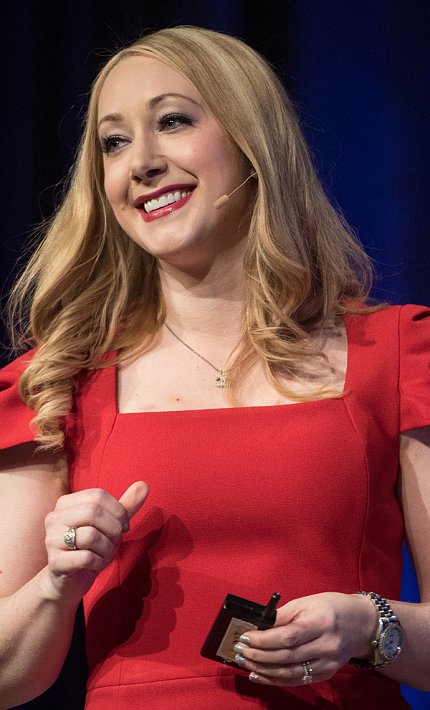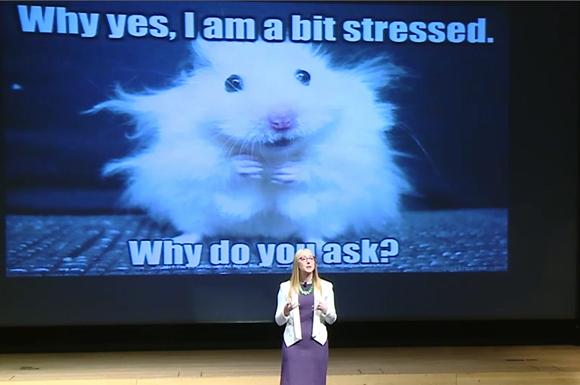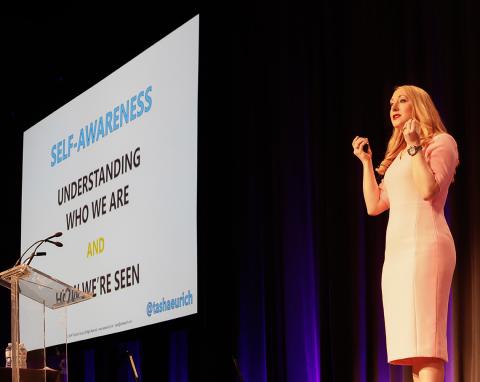Pillars of Insight
Eurich Explores Why Self-Awareness Matters

Do you consider yourself an above-average leader? Do you think your staff and other colleagues would agree?
When Dr. Tasha Eurich, an organizational psychologist, executive coach, researcher and best-selling author, asked the NIH audience assembled in Masur Auditorium to rate themselves as leaders, friends and drivers, many proud hands were raised for “above average” in each category. It was a revealing exercise about the power of self-awareness.
“Most people believe they’re above average on every socially desirable characteristic,” said Eurich at a recent Deputy Director for Management seminar. Laughter then erupted when she said, “The least competent people are the most confident about their abilities and performance.”
Almost everyone thinks they’re self-aware but only about 10-15 percent of people have achieved the status. Having self-awareness, said Eurich, means fully knowing who you are—your values, passions, goals, personality, strengths and weaknesses—and understanding how others perceive you.
“People who are self-aware at work are better performers and more promotable,” said Eurich. “They tend to be more respected and trusted co-workers and more effective leaders.” Beyond the workplace, she added, they’re generally happier in their personal relationships and tend to raise less narcissistic children.
All around the world, in every age group, “We’re all becoming more self-absorbed and less self-aware,” she said. “We need to gently stop assuming we’re already self-aware. Every one of us probably has more work to do than we think.”

After working with senior-level leaders for more than a decade and surveying thousands of people, Eurich has developed strategies to help us along our self-awareness journeys. She outlined several pillars of insight, unique to each of us. The deeper we delve into them, the more we can cultivate our own self-awareness.
What are the values by which we live and work? What are our passions and aspirations? What environments give us energy? What are our patterns of behavior? How do we react to different situations and what thoughts and emotions underlie that behavior? What impact do we have on others?
Eurich then focused on the three pillars she considers especially important for leaders: our values, reactions and impact.
Identify your core values and find one that’s the basis of your world, she said. Family. Health. Love. Service. Adventure. Simplicity. Challenge. Knowledge…These are but a few examples. After identifying which are most important, check in with yourself periodically, she said. Did your behavior this week mirror your core values?

“When we’re stressed, sometimes it’s really easy not just to not reflect on our values and behavior, but to do the exact opposite,” Eurich said. “Values are often aspirational. Just because it’s a value doesn’t mean we do it perfectly on a regular basis.”
Eurich gained some new insights from conducting something akin to a self-awareness clinical trial, tracking 50 people she dubbed “self-aware unicorns,” a group of admittedly unaware people who transformed themselves over time through coaching. They taught Eurich a few things, even upending common wisdom.
Such was the case for understanding reactions. Eurich thought she did. It seemed logical to assume that making the best decisions in the moment requires us to be self-reflective. The unicorns and hundreds of other surveys revealed the opposite.
“People who introspected were less happy, more stressed, more depressed, more anxious, less in control of their lives and less happy in their jobs,” said Eurich. It’s not that introspection is a bad thing, she realized, but that most of us approach it the wrong way. Most of us ask why when we should be asking what.
“The more we ask why, the more we ruminate,” she said. Instead of asking why am I stressed, ask what alterable patterns can I find in my stress. Instead of asking why am I unhappy, perhaps ask what upsetting situations can I avoid.
“Why questions draw us to our limitations; what questions help us see potential,” said Eurich. “Why questions can depress us and make us emotional. What questions help us to be more logical and action-oriented...and help us move forward.”
Leaders also must consider the impact they want to have on others and how they want to be perceived by others. Asking for feedback can be daunting, but it’s important for leaders to request and heed it.
Most unicorns listed 5 or fewer people they regularly came to rely on for feedback. They were picky about who to ask, said Eurich, acknowledging that sometimes feedback is not well-intentioned or helpful. Solicit feedback, she said, from loving critics—those you believe have your best interest at heart, but also those you believe will be truthful.
There’s always room to grow and, in the process, said Eurich, “you’re growing your self-compassion by seeing yourself more clearly.” Go easy on yourself. Aim for incremental improvements. “Try to be as focused as possible and that’s how you start to make dramatic improvements over time,” she concluded.
